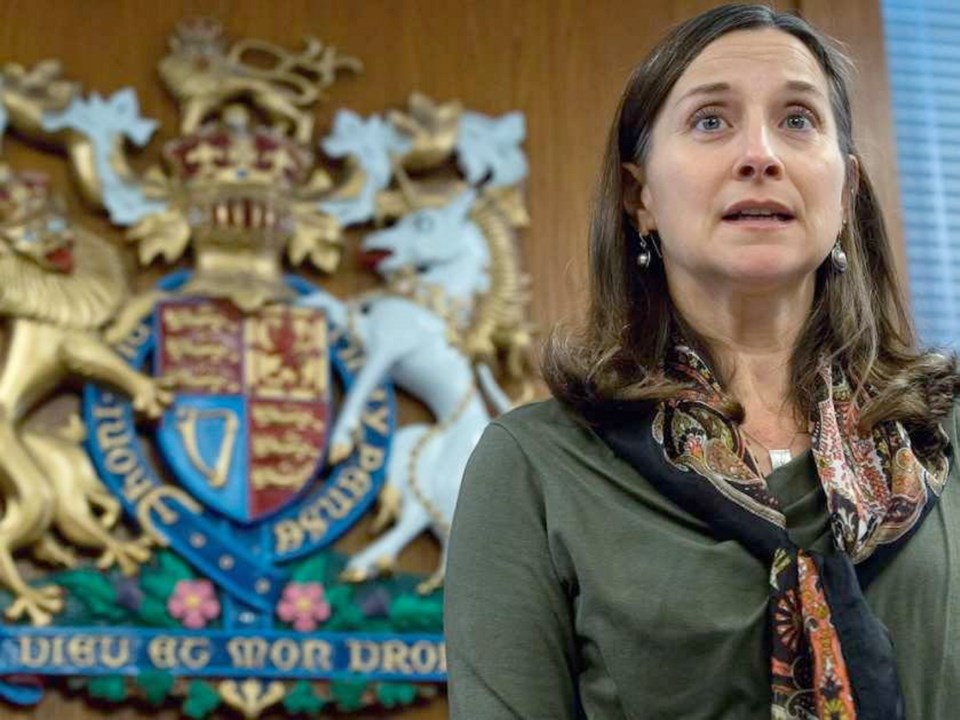The number of illicit overdose deaths in B.C. plateaued in 2018, but the province’s chief coroner and addictions experts say the public cannot become complacent, as people continue to die at an alarming rate.
Last year, 1,489 people in B.C. died of illicit drug overdoses, according to data released Thursday by the B.C. Coroners Service. That is about the same number of deaths seen in 2017. Fentanyl was detected in 86 per cent of deaths in 2018.
About four people a day die of illicit drug overdoses.
To put the numbers in perspective, more people died of illicit overdose deaths than suicides, homicides and vehicle deaths combined, said Lisa Lapointe, B.C.’s chief coroner.
“The illicit drug supply is unpredictable and unmanageable,” Lapointe said.
Provincial health officer Dr. Bonnie Henry said the alarming numbers underscore the need for low-barrier access to a regulated and safer supply of opioids to prevent people with addiction from turning to dangerous street drugs.
“These numbers are, of course, distressing. We are in no way near the end of this crisis and it continues to affect families across this province,” Henry said. “We need to expand the availability of safer regulated drugs to protect people who are dependent on this toxic drug supply.”
In Victoria, 94 people died of overdoses in 2018, up from 91 the year before.
Almost half of the people who died from overdoses in B.C. in 2018 had sought help with pain-related issues. According to the data, 77 per cent of people who died were described by family members as “regular or chronic” drug users.
People with addictions continue to be stigmatized in the health system, and Henry said there needs to be a formalized way of treating addiction as a health issue rather than as a criminal justice issue.
Dr. Evan Wood, executive director with the B.C. Centre on Substance Use, urged the federal government to end the prohibition against hard drugs such as heroin, which only serves to marginalize people with addictions.
He called on the province to develop a coherent addictions system of care because the current system is plagued with “tremendous gaps.”
Better training is needed for health care providers, who are often too quick to prescribe addictive opioids for pain management, Wood said.
“When the overdose crisis hit, it pulled back the curtain on how neglected substance use care has been across the province over the decades,” Wood said. “With the levelling off [of overdose deaths], it’s important to keep the pressure on and not become complacent.”
Leslie McBain, an overdose awareness advocate and founder of Moms Stop the Harm, said Monday will mark five years since her son, Jordan Miller, died of an overdose.
McBain said the number of deaths underscores the “extreme emergency” posed by the overdose crisis.
“When we look at the evidence and use common sense … the easiest way to stop the overdose deaths is to supply safe regulated drugs to people who need them,” she said.
Since declaring the surge in overdoses a public health emergency in 2016, the B.C. government has made take-home naloxone kits available at more than 1,480 locations, including almost 600 community pharmacies.
There are 21 overdose prevention sites and nine supervised consumption sites run by regional health authorities, none of which has seen any overdose deaths. In the past two years, those sites were visited more than one million times, according to the Ministry of Mental Health and Addictions.
In a statement, Judy Darcy, B.C.’s minister of mental health and addictions, said: “This crisis truly shows us that people from all walks of life — professionals, people living in poverty, tradespeople and many other sectors — are all affected by addiction.”
She said the province is “using every possible available tool to save lives,” including a pilot project at the St. Paul’s Hospital emergency department in Vancouver that provides people who have survived an overdose with take-home doses of suboxone and a treatment plan.



